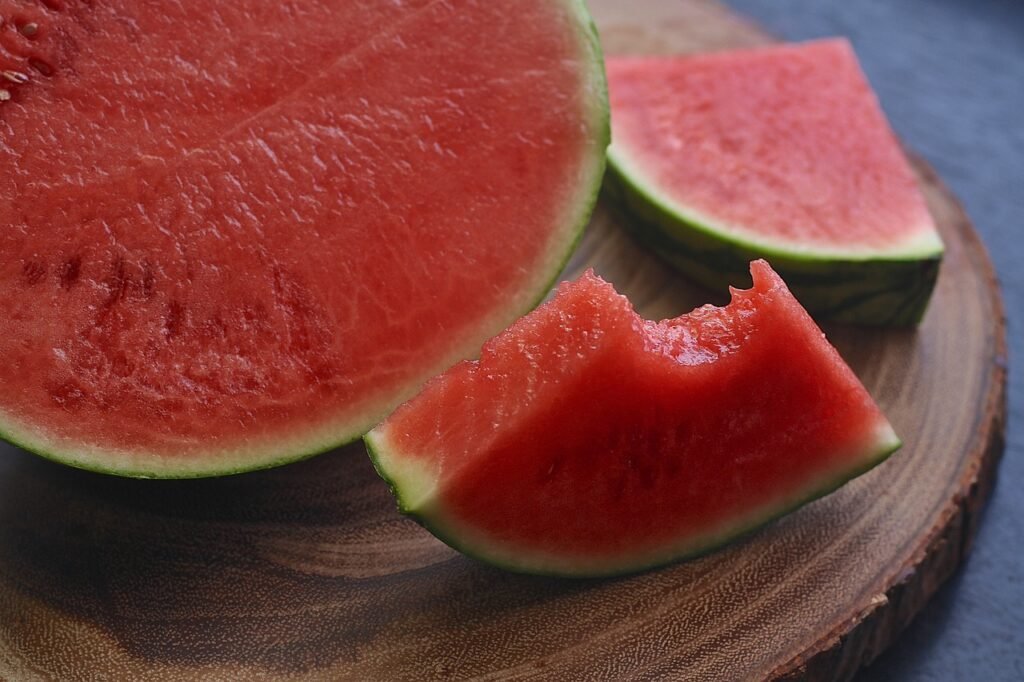Watermelon, with its juicy and refreshing flesh, is a summertime favorite for many. As we enjoy this delicious fruit, it’s natural to wonder if our furry companions can partake in the summery treat as well. Specifically, can dogs eat watermelon rinds? In this comprehensive guide, we will delve into the safety, benefits, and potential risks associated with dogs consuming watermelon rinds.
Understanding Watermelon Rinds:
Watermelon, scientifically known as Citrullus lanatus, is a tropical fruit cherished for its sweet, hydrating flesh. It consists of the outer green rind, the pink or red flesh, and the seeds. While humans typically consume only the flesh, watermelon rinds are often discarded or used in creative culinary endeavors.
Watermelon rinds are the tough, green outer layer of the fruit. They are not as juicy or sweet as the flesh but are still edible and contain certain nutrients.

Can Dogs Eat Watermelon Rinds?
The short answer is yes, dogs can technically eat watermelon rinds. However, there are several factors to consider before offering watermelon rinds to your canine companion.
Nutritional Value:
Watermelon rinds contain a variety of nutrients, including:
- Fiber: Watermelon rinds are rich in fiber, which can aid in digestion and promote gastrointestinal health in dogs.
- Vitamins: They contain vitamins A, B6, and C, which are essential for maintaining a dog’s overall health and immune function.
- Minerals: Watermelon rinds provide minerals like potassium and magnesium, which are important for nerve function and muscle health in dogs.
Benefits of Watermelon Rinds for Dogs:
- Hydration: Watermelon rinds have a high water content, which can help keep your dog hydrated, especially during hot weather.
- Dental Health: Chewing on watermelon rinds can help promote dental health by reducing plaque buildup and tartar formation. The fibrous texture of the rinds can also act as a natural toothbrush, helping to clean your dog’s teeth.
- Weight Management: The fiber in watermelon rinds can contribute to a feeling of fullness in dogs, potentially aiding in weight management by reducing overeating.
- Digestive Health: The fiber in watermelon rinds can aid in digestion and help regulate bowel movements in dogs, promoting gastrointestinal health.
Potential Risks and Precautions:
While watermelon rinds can offer health benefits to dogs, there are also potential risks and precautions to keep in mind:
- Choking Hazard: Watermelon rinds can be tough and fibrous, posing a choking hazard, especially for small dogs or dogs that gulp their food without chewing properly. Always monitor your dog while they are eating watermelon rinds to prevent choking incidents.
- Digestive Upset: Introducing new foods into your dog’s diet can sometimes lead to digestive upset, including diarrhea or vomiting. When offering watermelon rinds to your dog for the first time, start with small amounts and observe how your dog reacts.
- Pesticides and Chemicals: When feeding watermelon rinds to your dog, make sure they are organic and free from pesticides or harmful chemicals. Wash the rinds thoroughly before offering them to your dog to remove any dirt or residue.
How to Serve Watermelon Rinds to Dogs:
If you decide to offer watermelon rinds to your dog, follow these guidelines to ensure safety and enjoyment:
- Remove Seeds: Before giving watermelon rinds to your dog, make sure to remove any seeds, as they can pose a choking hazard or cause intestinal blockages.
- Cut into Bite-Sized Pieces: Cut the watermelon rinds into small, manageable pieces to prevent choking and make it easier for your dog to chew and digest.
- Supervise Your Dog: Always supervise your dog while they are eating watermelon rinds to prevent choking or other accidents.
- Limit Quantity: While watermelon rinds can be a healthy occasional treat for dogs, they should not make up a significant portion of their diet. Moderation is key to preventing digestive issues and maintaining a balanced diet for your dog.
Conclusion:
In conclusion, dogs can eat watermelon rinds in moderation, and they can provide certain health benefits such as hydration, dental health, and digestive support. However, it’s important to take precautions, including removing seeds, cutting the rinds into small pieces, and monitoring your dog while they eat. As with any new food, introduce watermelon rinds gradually and observe how your dog reacts. By following these guidelines, you can safely share the summery delight of watermelon with your canine companion.
Remember, every dog is unique, and what works well for one may not suit another. Consulting with your veterinarian before introducing new foods to your dog’s diet is always a wise decision. With proper precautions and moderation, watermelon rinds can be a delicious and nutritious addition to your dog’s treat repertoire. Enjoy sharing this summertime snack with your furry friend!

Pingback: Can Dogs Eat Watermelon? |